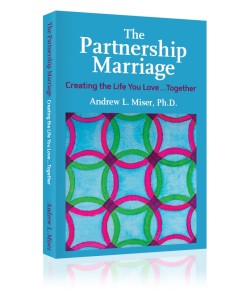Making Time for Conversation
 Life is very busy today. Martha and I often feel that we have too much on our plates and want to be less stressed and have more time for ourselves. Our businesses, our family, our friends, our garden, our health and our home take up sizable chunks of our attention. We feel as though we are living parallel lives, each of us on our own version of an unrelenting treadmill.
Life is very busy today. Martha and I often feel that we have too much on our plates and want to be less stressed and have more time for ourselves. Our businesses, our family, our friends, our garden, our health and our home take up sizable chunks of our attention. We feel as though we are living parallel lives, each of us on our own version of an unrelenting treadmill.
What helps us manage the treadmill successfully and even, at times, get off? We make time for conversation.
In my book, The Partnership Marriage: Creating the Life You Love…Together, I write, “…The kinds of conversations that you and your spouse routinely engage in over time have a profound impact on what is possible in your marriage and on the effectiveness of your partnership. The quality of your conversations shapes your experience of fulfillment in your life together and your expression of partnership in your marriage.”
I will admit that it is easier to find time to talk now that our children have grown and left home and that both Martha and I work from home. But, our making time for conversation with each other is not an accident. We make a committed and concerted effort to find time to converse with each other. Often, our conversations are planned in our calendar and, sometimes, they are quite spontaneous. We consciously look for times in our week when we can talk to each other.
Here’s what we do:
- We usually start the day together. We get up and often eat breakfast together. We don’t necessarily eat the same breakfast, but we’ll eat together. We’ll let each other know what we have on our schedules that day. That helps us to know what to expect during the day.
- We routinely check in with each other. This allows us to share what we are doing and a sense of how things are going. We each attend to a myriad of things each day.
- We usually eat dinner together, if we are both home. This is a time when we share about what we did during the day, what difficulties we encountered, what breakthroughs we had and what got accomplished and what didn’t. This is also when we talk about what we have planned for the evening.
- We spend Friday or Saturday nights just hanging out. We often love going out on the town to dinner, a play or a movie. We also enjoy, though, being at home on a weekend night, hanging out, often with a glass of wine and music in the background. We can unwind and converse about all kinds of things: Politics, our work, our family, our planned vacations or nothing of any importance at all. We simply enjoy each other’s company.
- We have a regular routine of meeting for an hour and half every Sunday morning to converse about the bigger picture in our lives and engage in planning around our businesses, our financial well-being, home improvement projects, social plans and support for our adult children. This is a time we can make plans for the future.
- When Martha and I have a long drive together, we will use that time in the car to talk about almost anything. We find this is a great time to catch up on things or talk about upcoming plans.
- We both love to read in bed before turning off the lights. But we’ll also often talk briefly about anything we need to in order to let go of the day, get a good night’s rest and be ready for the next day.
- Finally, during the week, we’ll call, email and text each other to stay in communication about just about anything that we both need to know.
Why do we do this? We are consciously aware that staying connected through conversation allows us to stay on top of everything we’ve got going on. We can take care of issues as they arise. We can stay in communication around the commitments we’ve got. We can share news in our family. We can share our daily victories and setbacks. We can look ahead and plan all kinds of things. We can tackle successfully the ceaseless list of things we both have to do. And…we can simply enjoy being with each other.
Reference
Miser, A. (2014) The partnership marriage: Creating the life you love…together. Charleston, South Carolina: Create Space Publishing.
Tags: Alignment, Andrew L. Miser, Co-creation, Conversation, Couples coaching, Intentional marriage, Partnership, Partnership marriage, The Partnership Marriage book, Understanding









